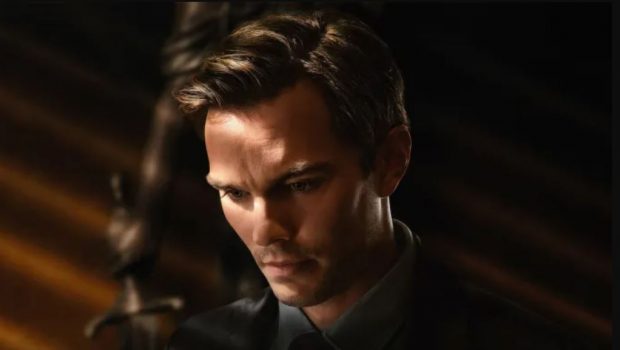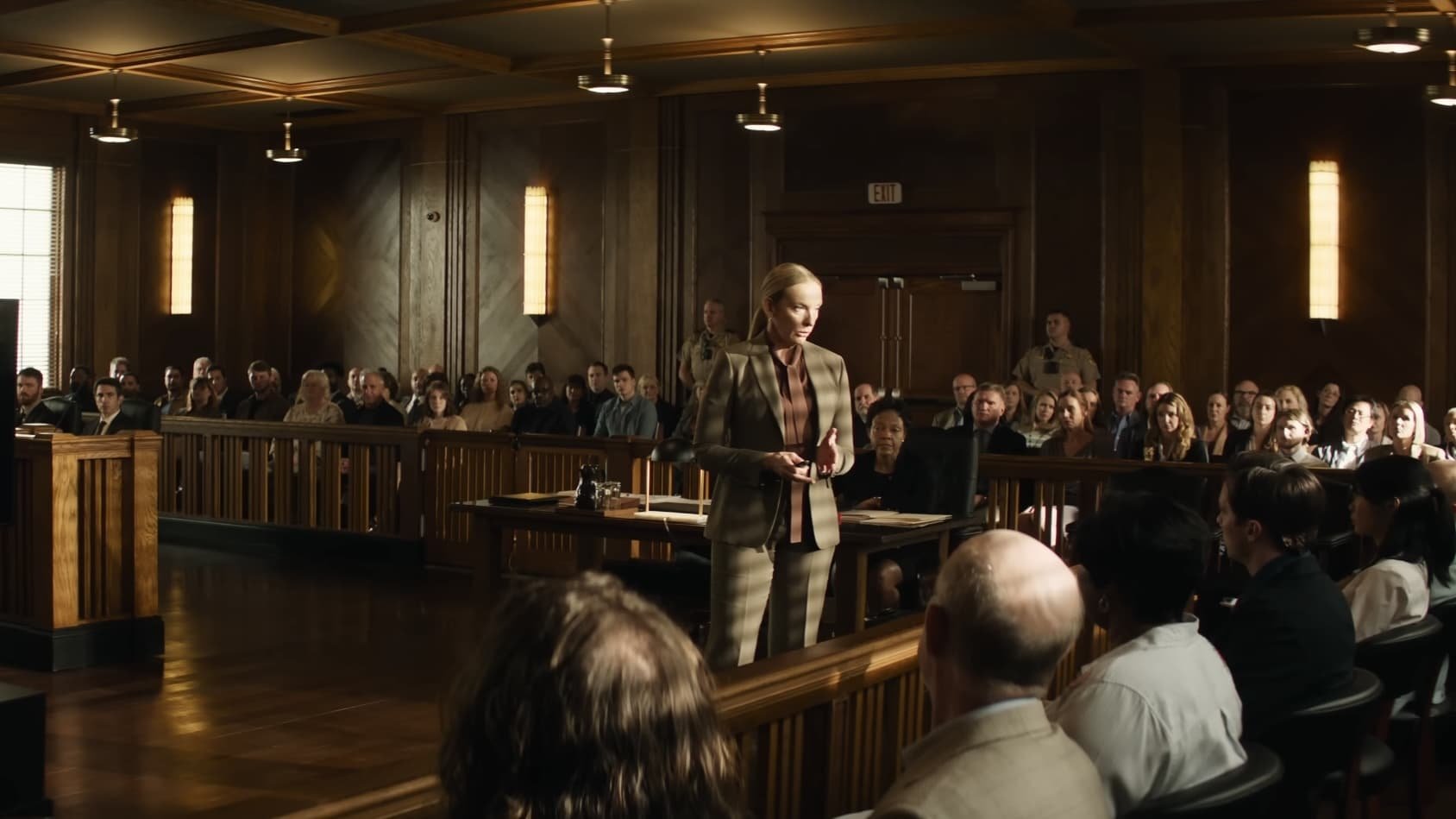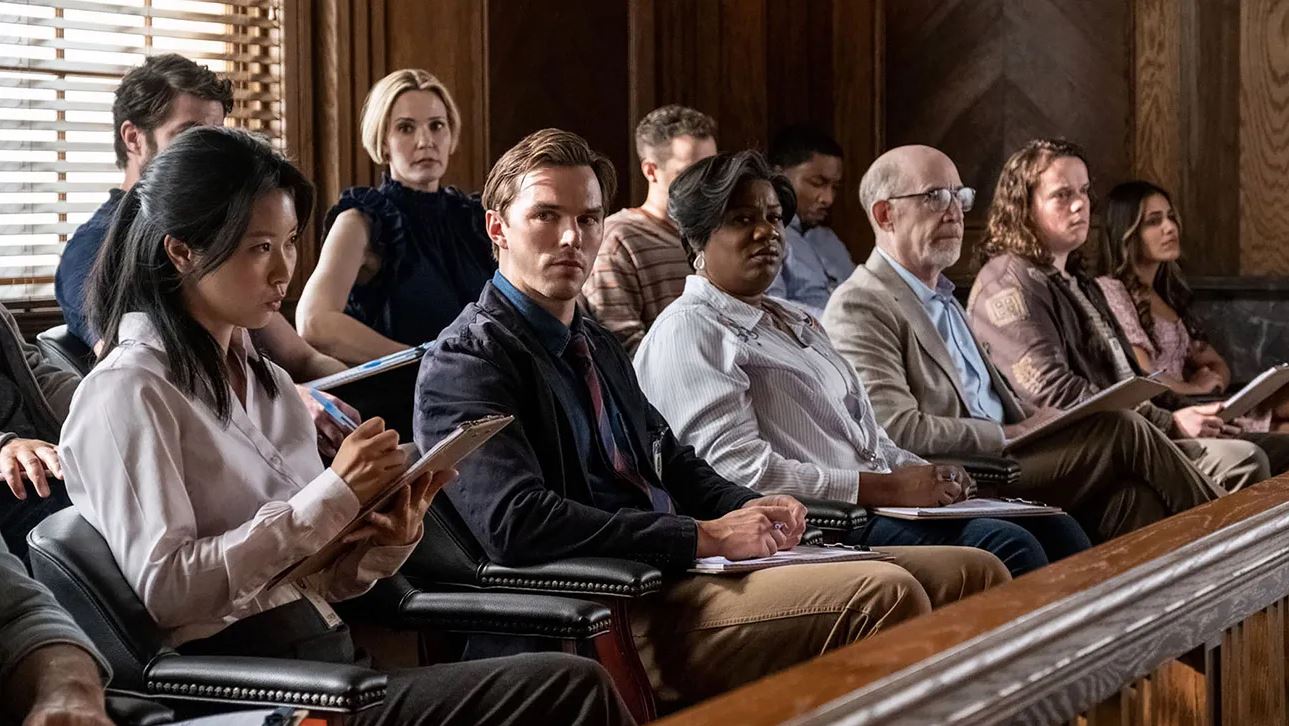Juror #2 – Film Review
Reviewed by Damien Straker on the 10th of January 2025
Warner Bros. presents a film by Clint Eastwood
Written by Jonathan Abrams
Produced by Clint Eastwood, Tim Moore, Jessica Meier, Adam Goodman, and Matt Skiena
Starring Nicholas Hoult, Toni Collette, J. K. Simmons, Chris Messina, Zoey Deutch, Cedric Yarbrough, and Kiefer Sutherland
Cinematography Yves Bélanger
Edited by Joel Cox and David Cox
Music by Mark Mancina
Rating: PG
Running Time: 114 minutes
Release Date: available to buy and rent online
Juror #2 is one of the tightest thrillers director Clint Eastwood has made in years. Sadly, many of the films Eastwood has recently directed have been clumsy and awkward. Too many have felt rushed and become too entrenched in right-wing jingoism. Its pleasing then that the ninety-four-year-old filmmaker has recomposed himself. Ironically, slowing down has worked in his favour. Juror #2 completely dispenses with jarring and divisive political commentary. Instead, it depicts a compelling courtroom mystery about truth and justice. It is also an effective view of personal guilt and denial. The whole film is also anchored by actor Nicholas Hoult (Nosferatu, The Great) who gives one of his best performances. Many of the film’s qualities suggest Eastwood has finally rediscovered what has made him for so long a major American filmmaker.
The film wastes no time establishing an incredibly juicy dramatic premise. A writer named Justin (Hoult) and his wife, Allison (Zoey Deutch), are happily married and expecting their first child. However, his care for her is interrupted when he is summoned for jury duty. While he attempts to make an early exit, he is soon locked in as the panel’s second juror. The case is a murder trial. A man, James Sythe (Gabriel Basso), is accused one year ago of murdering his girlfriend, Kendall. One night the couple had an argument in a bar. Her body was then found below a bridge, smashed upon the rocks. The prosecutor, Faith (Toni Collette), accuses James of throwing Kendall off the bridge. Meanwhile his own lawyer (Chris Messina) attempts to dismiss the case and its unreliable witnesses. He even pleads with the judge at one point for a mistrial!
As the case is outlined, Justin has a stark internal revelation. He was at the bar the same night as the couple. Since he is a recovering alcoholic, he assures his wife he did not relapse and drink. However, his memory is unreliable. In a panic, he fears he might have killed Kendall by hitting her with his car. Worse, he cannot say for certain if during the rain-soaked night he hit her. A deer crossing sign suggests it could have been an animal. He consults a friend (Kiefer Sutherland) who is a lawyer. He is told being a recovering alcoholic coupled with this crime could see him gaoled for up to thirty years. Meanwhile, the other jurors are increasingly frustrated with Justin delaying a unanimous guilty verdict. He must keep his own sins hidden from them but also can’t bring himself to immediately condemn James. Meanwhile, another juror, Harold (J.K. Simmons, excellent), conducts his own research, which breaches the court rules. Harold’s interference and his own backstory creates a window for Justin to try and have the entire case dismissed.
Warner Bros’ reluctance to support this film and its accomplished director was bizarre. Having only cost $30 million to make (Eastwood is typically economical) a lucrative box office run was imminent. Instead, they refused to expand the film’s US cinema release and then unceremoniously dumped it onto HBO Max. In Australia, the court was adjourned entirely. There was no theatrical release! The decision is particularly disappointing given the skill with which Eastwood has assembled the story. Nothing in Juror #2 is wasted. Cutting it to the bone sustains the tension for the film’s entirety. When so many shows and films are extensively padded with filler, something this taut is both accomplished and novel. It also benefits from Yves Bélanger’s attractive and unfussy cinematography too. Both the courthouse and the key location of the bridge become handsome cinematic locations. Further adding to the tension is the story’s moral ambiguity. Eastwood dissolves easy, black and white conclusions. There are no clear heroes and villains either. In the end we are pressed to decide for ourselves and question various contrivances and logistics. Why was an unsuitable jury member chosen? How is it that someone was hit by a car and then tipped over a high railing? There are inconsistencies and holes, which is part of the fun of a great thriller rather than an airtight police procedural. The strong filmmaking coupled with this level of ambiguity is why the film deserved more support from its distributor.
Debunking bureaucracy and justice have long been staples of Eastwood’s filmography as both an actor and director. Various films, including Dirty Harry (1971), Unforgiven (1992), and Mystic River (2003) have worked to deconstruct vigilantism as an appropriate form of justice. While there is no on-screen violence in Juror #2, its thematic intent concerns the separation of truth and justice and how the judicial system and bureaucrats are overworked and under resourced. The outcome of this case is being determined by the characters’ personal agendas. The most obvious is that Justin would like to derail proceedings so he can save both himself and James from persecution. However, he is told it will only end with a definitive conclusion. Someone must take the fall. It is also noted that Faith is vying to be elected as the District Attorney. Finding James Sythe guilty would strengthen her political ambitions. The other jurors are equally restless. As shown in 12 Angry Men (1957) and The Simpsons episode “The Boy Who Knew Too Much”, it is a predictable staple that the jurors would prefer a quick resolution over the truth. One woman here wants it resolved quickly to return to her children. Another juror (played by Cedric Yarbrough) believes he has a solid personal reason. He deems James guilty because his tattoos recall a family grievance. Hard objective truths and justice are dissolved in favour of personal biases that will benefit anyone but the accused.
After his glorious comedic turns in The Great and The Menu (2022), a shift in mood is a welcome change for actor Nicholas Hoult. Juror #2 marks one of his most muted and subtle performances to date. Much like the film’s understated direction, nothing in his performance is overly dramatic or showy. At most, he makes the discomfort of Justin quietly visible as he comes to terms with the stark realisation that he will either send an innocent man to prison for life or worse that he might not ever see his own wife again. Beneath this terrible dilemma and the key performance is a story of addiction. Justin’s repressed memory of the bar mirrors his denial of his own alcoholism (another classic Eastwood staple). He tells people he used to be an addict and has the sobriety chip to prove his rehabilitation. Yet there is a moment where we cannot say for certain whether this man, who frequently talks his way out of trouble, lapsed and had a drink again. Hoult embodies all the complexities of this elusive character very well from appearing as a loving husband to being guilt-laden and then increasingly slippery about his accountability.
Juror #2 marks a long-awaited return to form for Eastwood as a storyteller. The rock-solid script is the critical foundation that allows him to streamline the narrative into a tense thriller around guilt, denial, and justice. As mentioned, nothing here is overstated. The placement of each story beat is incredibly tight and kept at a deliberately measured, compelling pace. It also benefits from a subdued, intelligent performance from Nicholas Hoult. The actor proves his versatility by showing the conflicting emotions in his character. He is a sizable reason why we remain invested in the case and why we are left uncertain. As in the best thrillers, nothing is transparent or black and white. It deliberately inspires debate. We are left mulling over the details, so the inconsistencies or plot holes become viable talking points. Shame on Warner Bros. for not having any faith in its modest but dependable adult storytelling. Watching it at home will now make for a solid companion piece to other modern courtroom thrillers, such as Anatomy of a Fall (2023).
Summary: Juror #2 is one of the tightest thrillers director Clint Eastwood has made in years. Shame on Warner Bros. for not having any faith in its modest but dependable adult storytelling.









